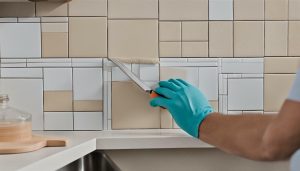Dealing with ants in the kitchen can be a frustrating and persistent problem. These tiny pests can be found in the most unexpected places, from countertops and cabinets to food containers and even appliances. However, finding effective strategies to eliminate kitchen ants is essential for maintaining a pest-free home. In this article, we will explore natural and non-toxic ant removal methods, as well as preventive measures to avoid ant infestation in the kitchen.
Key Takeaways:
- Eliminating kitchen ants requires a multi-step approach that includes prevention, natural repellents, DIY removal methods, and non-toxic extermination products.
- Sealing entry points, keeping the kitchen clean, and removing potential food and water sources are essential steps to prevent ant infestation in the kitchen.
- Vinegar, essential oils, and diatomaceous earth are natural ant repellents that can be used in the kitchen.
- DIY removal methods such as homemade ant baits and vinegar and water ant sprays can be effective in getting rid of ants in the kitchen.
- Boric acid, diatomaceous earth, and other natural ant control products can be used as non-toxic extermination options.
- Professional ant control services should be considered for severe ant infestations in the kitchen.
- Maintaining a pest-free kitchen requires regular cleaning and maintenance, sealing entry points, and ongoing ant prevention practices.
Understanding the Behavior of Kitchen Ants
Before initiating any ant removal strategy, it is crucial to have a basic understanding of the behavior of kitchen ants. Ants are social insects that live in colonies and establish their nest in soil, wood, or other material that can provide shelter and moisture. However, some ant species can make their way into our kitchens in search of food and water.
There are several ant species that are commonly found in kitchens, such as the odorous house ant, the pavement ant, and the carpenter ant. The odorous house ant is attracted to sugary substances, while the pavement ant prefers high protein food like meat and cheese. Carpenter ants, on the other hand, do not consume food but can cause structural damage to homes.
Ants usually enter the kitchen through small cracks and gaps, and it is important to identify the entry points they use to access the food and water sources in your kitchen. Common entry points for ants include gaps around doors and windows, pipes, and electrical wires.
Ant Prevention Tips for a Pest-Free Kitchen
If you’re looking for ways to keep those pesky ants away from your kitchen, prevention is key. By taking proactive steps to eliminate potential food and water sources, you can prevent ant infestations from taking hold in the first place.
Keeping the Kitchen Clean to Prevent Ant Infestation
One of the most effective ways to prevent ant infestations is to keep your kitchen clean. This means wiping down counters and surfaces regularly, and cleaning up any spills or crumbs as soon as they happen. Any food that is left out should be stored in airtight containers, and trash should be taken out regularly to prevent it from attracting ants.
Sealing Food Containers
Ants are attracted to food sources, so it’s important to store food in sealed containers to prevent them from accessing it. This is especially important for pet food, which can be a prime target for ant infestations. Seal any food containers tightly and keep them out of reach of ants.
Removing Food and Water Sources for Ants
In addition to keeping your kitchen clean and storing food in sealed containers, it’s important to eliminate any potential food and water sources for ants. This means fixing any leaky pipes or faucets, and drying up any standing water in the kitchen. Ants need water to survive, so by removing their access to it, you can help prevent them from taking up residence in your kitchen.
Natural Ant Repellents for the Kitchen
If you’re looking for natural ant repellents to keep your kitchen free of these pesky insects, there are several options you can try. Many of these remedies use common household ingredients and are non-toxic, making them safe for use around pets and children.
Using Vinegar to Repel Ants
Vinegar is a natural ant repellent that can effectively discourage ants from entering your kitchen. To use vinegar as an ant repellent, mix equal parts of vinegar and water in a spray bottle and spritz the solution around the areas where ants are entering your kitchen. Ants are repelled by the strong scent of vinegar and will avoid the sprayed areas.
Using Essential Oils as Ant Repellents
Essential oils can be used as natural ant repellents due to their strong scents and properties that are toxic to ants. Peppermint, tea tree, and lemon essential oils are particularly effective in repelling ants. To use these oils, mix a few drops of the desired oil with water in a spray bottle and spray the solution around entry points and along ant trails.
Diatomaceous Earth for Ant Control
Diatomaceous earth is a natural substance that can be used to effectively control ants in the kitchen. It works by absorbing the waxy outer layer of ants, causing them to dehydrate and die. To use diatomaceous earth for ant control, sprinkle a thin layer of the powder around entry points, along ant trails, and near their nests. Be sure to use food-grade diatomaceous earth to avoid any potential health risks.
By using these natural ant repellents, you can effectively eliminate ant infestations in your kitchen without resorting to toxic chemicals or harmful pesticides.
DIY Ant Removal Methods
When it comes to getting rid of ants in the kitchen, there are several DIY ant removal techniques that can be easily implemented at home. These methods are not only effective but also non-toxic, making them a safe and affordable alternative to commercial ant control products. Here are some of the most popular DIY ant removal methods:
Homemade Ant Baits
One of the easiest and most effective DIY ant removal techniques is using homemade ant baits. To make an ant bait, mix 1 tablespoon of borax with 1 tablespoon of granulated sugar in a small container. Add a few drops of water to create a paste and place the bait in areas where ants are commonly found. The ants will take the bait back to their colony, effectively eliminating the entire ant population.
Using Borax to Kill Ants
Borax is a natural mineral that is often used as a cleaning agent, but it can also be used to kill ants. To make a borax solution, mix 1 tablespoon of borax with 1 cup of warm water and 1/2 cup of granulated sugar. Soak cotton balls in the solution and place them in areas where ants are commonly found. The ants will feed on the sugar and bring the borax back to their colony, effectively killing the entire ant population.
Vinegar and Water Ant Spray
Vinegar is another natural ingredient that can be used to repel and kill ants. Mix equal parts of white vinegar and water in a spray bottle and shake well. Spray the solution directly onto ants or in areas where ants are found. The strong smell of vinegar will deter ants from entering the area, effectively repelling them and preventing future infestations.
These DIY ant removal techniques are simple and effective ways to eliminate kitchen ants without resorting to toxic chemicals. However, it’s important to note that severe ant infestations may require the assistance of a professional ant control service.
Non-Toxic Ant Extermination Products
When it comes to eliminating ant infestations in the kitchen, non-toxic ant extermination options are a safe and effective choice. Here are a few natural ant control products and methods to consider:
| Product/Method | Description |
|---|---|
| Diatomaceous Earth | Food-grade diatomaceous earth is a natural powder that can be used to eliminate ants. The powder absorbs the oils and fats from the insect’s exoskeleton, causing them to dehydrate and die. Sprinkle the powder on ant trails and entry points, and around the perimeter of your kitchen. |
| Boric Acid | Boric acid is a common ingredient in ant baits and can also be used as a standalone treatment. The acid damages the ants’ digestive systems and causes them to die. Mix boric acid with a sugary or protein-rich substance to create a homemade bait, and place it near ant trails and entry points. |
| Natural Ant Control Products | There are several natural ant control products available that use essential oils, botanicals, or other natural ingredients to repel or kill ants. Look for products that are labeled as safe for indoor use and follow the instructions carefully. |
When using non-toxic ant extermination products, it’s important to remember that they may not work as quickly as chemical insecticides. It may take several days or even weeks to see results, but the long-term benefits of using natural methods far outweigh the risks associated with chemical pesticides.
In addition to these natural ant control methods, it’s crucial to maintain a clean and tidy kitchen to prevent future ant infestations. Keep food sealed in airtight containers, wipe down countertops and surfaces regularly, and fix any leaks or moisture issues that could attract ants.
Professional Ant Control Services
While DIY ant removal methods and natural ant repellents can be effective for minor ant infestations, severe ant problems may require the assistance of professional ant control services.
If you notice that your ant infestation is out of control and none of the DIY solutions seem to work, it might be time to call in an exterminator. Professional ant control services have access to specialized equipment and chemicals that can effectively eliminate ant infestations, even those that are deeply rooted.
However, before hiring an exterminator, make sure to do your research and choose a licensed and reputable professional. Ask for references and check online reviews to ensure that the company has a good track record.
In addition, keep in mind that professional ant control services can be costly, so it is important to weigh the benefits and costs before making a decision. In some cases, it may be more cost-effective to implement preventive measures to avoid future ant infestations rather than to pay for ongoing professional services.
In general, it is best to seek professional assistance for severe ant infestations or if DIY methods have proven ineffective. Exterminators can provide a more comprehensive approach to ant removal, and can help ensure that your kitchen remains pest-free for the long term.
Maintaining a Pest-Free Kitchen
Once you have successfully eliminated the ants from your kitchen, it is important to maintain a pest-free environment. Regular cleaning and maintenance are essential to prevent another infestation. Here are some tips to help keep the ants away:
Regular Cleaning and Maintenance
One of the simplest ways to maintain a pest-free kitchen is to keep it clean. Wipe down countertops, sweep the floors, and take out the garbage regularly. Ensure that all food is stored in sealed containers, and clean up any spills immediately. Don’t leave dirty dishes in the sink overnight, and make sure to clean up any pet food or water spills.
Sealing Entry Points
The next step is to seal all entry points that ants could use to access your kitchen. This means caulking any cracks or gaps in walls, floors, or windows. Check for gaps around pipes, electrical outlets, and vents, and seal them with silicone caulking or another appropriate sealant. Ensure that doors and windows fit tightly, and install weather stripping if necessary to prevent ants from sneaking in.
Ongoing Ant Prevention Practices
Finally, implement ongoing ant prevention practices to keep the pests at bay. Consider using natural ant repellents, such as essential oils or diatomaceous earth. Place ant baits in areas where ants are likely to travel, but keep them out of reach of children and pets. Keep an eye out for any signs of ant activity, and act quickly to address any issues before they become more serious.
By following these tips for maintaining a pest-free kitchen, you can help to prevent future ant infestations and keep your home healthy and safe.
Frequently Asked Questions (FAQs) About Kitchen Ants
Dealing with kitchen ants can be a frustrating experience, so we’ve compiled a list of common questions about kitchen ants to help you find the best ant control tips and tricks:
What attracts ants to the kitchen?
Ants are attracted to the kitchen because it is a source of food and water. They can detect even the smallest crumbs left on countertops, floors, or in cabinets. Ants are also attracted to sweet and sugary substances, such as honey, fruit juices, and syrup.
How do I identify the ant species in my kitchen?
There are several ant species that can be found in the kitchen, including odorous house ants, pavement ants, and carpenter ants. To identify the species, look at the ant’s body shape, color, and size. You can also consult an online identification guide or seek the advice of a pest control professional.
What are some natural ways to get rid of ants in the kitchen?
There are several non-toxic ant repellents that can be used in the kitchen, such as vinegar, essential oils, and diatomaceous earth. You can also create homemade ant baits using borax or sugar and water. Keeping the kitchen clean and sealing entry points can also help prevent ant infestations.
When should I hire a professional ant control service?
If DIY methods have not been effective in eliminating ant infestations in the kitchen, it may be time to seek professional help. Professional ant control services have access to specialized tools and equipment that can effectively eliminate ant colonies and prevent future infestations.
How can I maintain a pest-free kitchen after eliminating ants?
Regular cleaning and maintenance are key to keeping the kitchen free of ants and other pests. This includes keeping food in sealed containers, wiping down countertops and floors regularly, and sealing any entry points that ants may use to access the kitchen.
- Ant FAQ
- Common questions about kitchen ants
- Ant control tips and tricks
Conclusion
Dealing with kitchen ants can be a frustrating experience, but it is important to remember that effective ant removal strategies can make all the difference. To summarize, understanding the behavior of ants and identifying their entry points is crucial in preventing an infestation. Keeping the kitchen clean, sealing food containers and eliminating potential food and water sources for ants are important preventive measures that can be taken.
Natural ant repellents like vinegar and essential oils, as well as DIY ant removal methods such as borax and homemade ant baits, can be effective in eliminating ants in the kitchen. For more severe infestations, non-toxic ant extermination products and professional ant control services may be necessary.
It is important to maintain a pest-free kitchen by regularly cleaning and maintaining the area, sealing entry points, and implementing ongoing ant prevention practices. By following these strategies, you can effectively show those tiny kitchen ants the door!
FAQ
Q: How can I eliminate kitchen ants?
A: There are several effective ways to get rid of ants in your kitchen. You can try natural remedies such as using vinegar or essential oils as ant repellents. DIY methods like creating homemade ant baits or using borax can also be effective. Sealing entry points and keeping your kitchen clean are important preventive measures.
Q: What are some natural ways to get rid of ants in the kitchen?
A: Natural ant repellents can be used to deter ants from your kitchen. Vinegar is a common household ingredient that can be sprayed onto ant trails or entry points to repel them. Essential oils, such as peppermint or citrus, can also be effective in deterring ants. Another natural option is diatomaceous earth, which can be sprinkled near ant entry points to kill them.
Q: How can I prevent ant infestation in the kitchen?
A: To prevent ant infestation in your kitchen, it is important to keep it clean and free of food and water sources. Seal food containers tightly, clean up spills promptly, and regularly remove garbage. Additionally, sealing entry points such as cracks or gaps in windows, doors, and walls can help prevent ants from entering your kitchen.
Q: What are some effective ant repellents for the kitchen?
A: For natural ant repellents in the kitchen, you can try using vinegar or essential oils. Both of these options can be sprayed directly onto ant trails or entry points to deter them. Diatomaceous earth, a natural powder, can also be effective in repelling ants when sprinkled near their entry points.
Q: Are there any DIY ant removal methods I can try?
A: Yes, there are several DIY ant removal methods that you can try in your kitchen. You can create homemade ant baits using ingredients like sugar or honey mixed with borax. Borax is toxic to ants, and they will take the bait back to their nest, eventually eliminating the colony. Another DIY method is using a vinegar and water solution to spray directly on ant trails or entry points.
Q: Are there any non-toxic ant extermination products available?
A: Yes, there are non-toxic ant extermination products that you can use in your kitchen. Diatomaceous earth is a natural and safe option that can be sprinkled near ant entry points to kill them. Another option is boric acid, which is toxic to ants but considered safe for humans. You can also find other natural ant control products in the market.
Q: When should I consider hiring professional ant control services?
A: If you have a severe ant infestation in your kitchen that is difficult to control with DIY methods, it may be time to consider hiring professional ant control services. Professionals have the expertise and tools to effectively eliminate the infestation and prevent further problems.
Q: How can I maintain a pest-free kitchen?
A: To maintain a pest-free kitchen, it is important to regularly clean and maintain the area. This includes wiping down surfaces, washing dishes promptly, and storing food in sealed containers. Additionally, sealing entry points such as cracks or gaps can help prevent pests from entering your kitchen. Ongoing ant prevention practices, such as keeping your kitchen clean and eliminating food and water sources, are also important in maintaining a pest-free environment.

It’s me, Amber Hayden, the heart and soul behind SagarmathaOnlineMedia.com. From a young age, I’ve been head over heels for everything home-related, from interior decor to gardening. I’m the type who can’t resist a well-crafted piece of furniture, and I firmly believe that a home isn’t complete without a pet or two. But it’s not just about creating pretty spaces for me. I’m all about making homes that tell a story reflecting the people living there. SagarmathaOnlineMedia.com is my way of sharing this passion with you. Whether you’re looking for tips to jazz up your living room, advice on pet care, or ideas to make your garden bloom, I’m here to help. So, let’s embark on this journey together and make your house a home!



